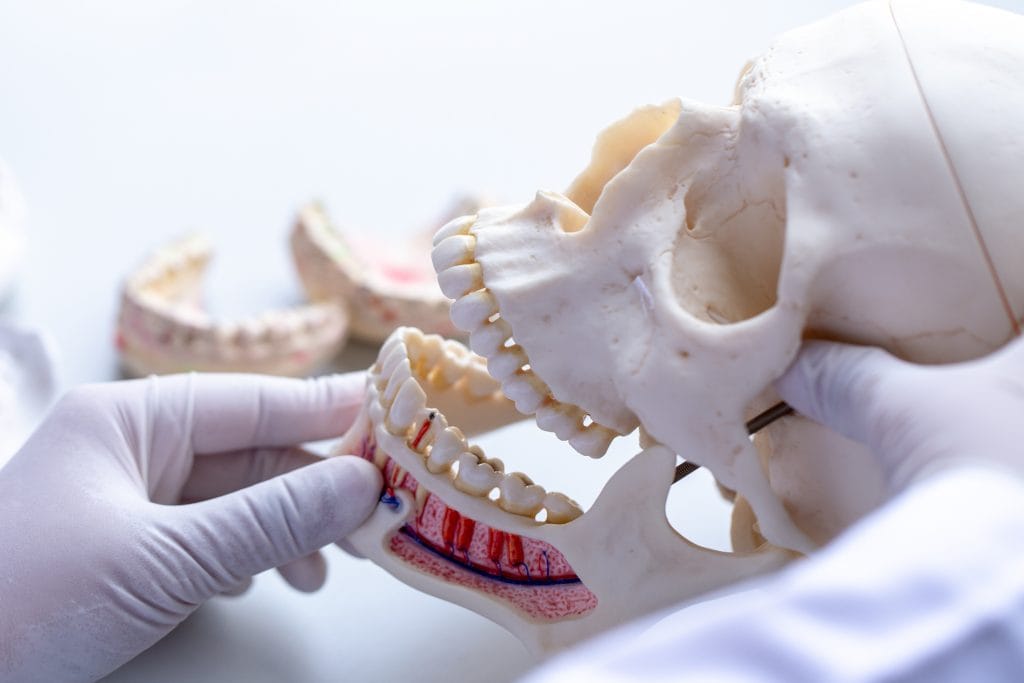Oral and maxillofacial surgeons specialise in the diagnosis and treatment of diseases affecting the mouth, jaws, face and neck. They work alongside other specialists such as orthodontists, prosthodontists, radiologists, pathologists, oncologists, ENT surgeons, neurosurgeons, and plastic surgeons.
The following types of surgery are performed by oral and maxillofacial surgeons:
- Preprosthetic surgery
- Dentoalveolar surgery for the removal of impacted teeth or jaw cysts
- Dental implant surgery and bone grafting to replace missing teeth or stabilise dentures, to rehabilitate patients who underwent surgery for tumours, or to retain facial prostheses
- Orthognathic surgery for dentofacial deformities
- Facial trauma surgery for facial bone fractures and related soft tissue injuries
- Reconstructive surgery of the face
- Cleft lip and palate surgery
- Congenital craniofacial deformities
- Facial plastic surgery such as rhinoplasty, rhytidectomy, blepharoplasty, fand acial implants
- Temporomandibular joint disorder (TMJD)
- Sleep apnea correction surgery
- Tumour and cancer surgery
Please refer to the Australian and New Zealand Association of Oral and Maxillofacial Surgeons and International Association of Oral and Maxillofacial Surgeons websites for further information.

Accreditation of Training Program
The Oral and Maxillofacial Surgery (OMS) Training Program of the Royal Australasian College of Dental Surgeons (RACDS) has been jointly accredited by the Australian Medical Council (AMC), the Medical Council of New Zealand (MCNZ), the Australian Dental Council (ADC) and the Dental Council of New Zealand (DCNZ) to deliver specialist medical and dental education, training and continuing professional development programs.
The AMC and the MCNZ have granted accreditation for five years until 31 March 2028, subject to satisfying monitoring requirements including progress reports and addressing accreditation conditions.
Furthermore, the ADC and DCNZ have granted accreditation for a period of five years until 31 December 2027, subject to satisfying monitoring requirements including progress reports and addressing accreditation conditions.
Please refer to the Accredited Training in OMS Handbook and Accredited Training in OMS Curriculum for further information.
Accreditation of Training Posts
The College accredits training posts within institutions (e.g., hospital, oral health centre, private practice) in Australia and New Zealand. The accreditation process ensures that all training posts provide an appropriate learning environment that fosters the training of safe and competent oral and maxillofacial surgeons.
The following training posts are currently accredited:
New Zealand Training Centre
Western Australia Training Centre
Victoria Training Centre
|
Queensland Training Centre
New South Wales and Australian Capital Territory Training Centre
South Australia and Tasmania Training Centre
|
Please refer to the OMS Standards and Criteria for Accreditation of Regional Training Centres, Hospitals, and Posts for the accreditation process and further information.
Reconsideration, Review and Appeal
The College recognises its responsibility in making decisions affecting international medical graduates, trainees, Members, and Fellows. Where an affected party or candidate believes that they have been adversely or unfairly affected by the decision of the College, the College provides a transparent and robust avenue for the resolution of the disagreement.
In order to assist all parties, procedures have been developed to indicate what is meant by Reconsideration and Review and the connection between these processes and a formal Appeal.
- The Reconsideration phase enables the original decision maker(s) to reconsider their original decision. The affected party or candidate is allowed to provide any information that may assist with this process. If, following this phase, the affected party or candidate is not satisfied with the outcome, they may request a Review within 30 days of receiving advice on the outcome.
- The Review phase enables a College body with oversight of the original decision maker(s) to review the original decision and all associated supporting documentation to ascertain whether the original decision should be upheld or overturned. If, following this phase, the affected party or candidate is not satisfied with the outcome, they may Appeal within 30 days of receiving advice on the outcome.
- The Appeals phase requires a formal application with strict procedures to ensure it is conducted following procedural fairness and transparency. This phase involves the constitution of an Appeals Committee and therefore imposes an associated fee.
The following decisions by the committees and Board of Studies in OMS are subject to these processes:
- accreditation of regional training centres and training posts within institutions
- selection of trainees for the OMS Training Program
- examination result
- midterm and six-monthly assessment outcomes
- trainee progression, including recognition of training or dismissal from training
- final assessment decision for specialist assessment in Australia
- applications for admission to Fellowship
- participation and compliance in the CPD programs
- financial status of Fellows, trainees, or other members
Please refer to the RACDS Reconsideration, Review and Appeals Policy for the application process and further information.